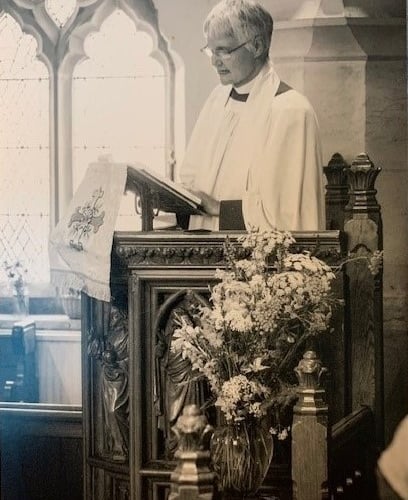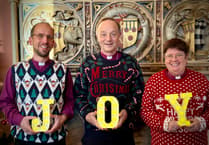ONE of the first women to be ordained as a priest has preached at her former parish church today, Mothering Sunday, to mark the 30th anniversary of the first women’s ordination to the priesthood on March 12, 1994.
Rev Jane Wilson is the former vicar of Offwell in East Devon and returned there today.
She was ordained as a deacon in London Diocese in 1991.
At the time women were not permitted to become priests like men. Only priests are permitted to conduct weddings and baptisms, officiate at a communion service and be the priest-in-charge of a parish or group of parishes.
Jane said: “I enjoyed my curacy, but it was painful when the men in our training group went on to be ordained priest in 1992 and the women were not included.”
In November 1992, after years of campaigning by pro women’s ordination groups, the Church of England’s General Synod voted in favour of women being admitted to the priesthood.
Anne Foreman, a former National Youth Advisor for the Church of England and General Synod member, who lives in Exeter, recalled the moment the vote was counted: “November 11, 1992 found me watching the count of the vote with colleagues in Church House Westminster where I was based.
“Though by tradition all voting results are received in silence, as we clasped each other’s hands we heard the sound of the crowd of supporters gathered outside singing, clapping and cheering as the result filtered through.
“Royal Assent followed on November 5, 1993, leading to the ordination of 32 women on March 12, 1994. As a Movement for the Ordination of Women (MOW) supporter and campaigner for years this was a joyful day indeed!”
Jane Wilson said: “I was not a vociferous campaigner, but after the vote in 1992 I realised how much I longed to be a priest and waited for the day when we could be ordained.”
Jane’s ordination was set for Saturday, April 16, 1994 at St Paul’s Cathedral in London.
She recounts: “The service nearly did not go ahead as a priest, Father Paul Williamson, had taken out an injunction saying to ordain women was against the law because the Book of Common Prayer (on which church law is based) only referred to male presbyters (ministers).
“The women were waiting in the Chapter House to hear if the service would go ahead.
“The injunction was dismissed, and we made our way into the Cathedral for our Ordination.
“The bishop had promised Father Williamson that he could speak his objections in the service when the question was asked ‘Is it your wish that these persons be ordained?’
“Father Williamson spoke for five minutes, then the supporting clergy shouted for him to stop.
“He addressed us as sisters in Christ... then told us we were heretics.
“After that, all the women were asked to stand and face the congregation (about 2,000 people) and the bishop repeated the question, at which 2,000 people shouted ‘Yes!’
“When that happened, most of the women (including me) were in tears.”
Jane was ordained at St Paul’s alongside the current Acting Bishop of Exeter, the Rt Rev Jackie Searle, who also went on to become one of the first generation of women bishops.
Reflecting on the anniversary, Bishop Jackie said: “I was ordained as a deacon in the summer of 1992, and also got married that year.

Bishop Jackie on her Ordination Day in 1994. “In 1994 when I was ordained as a priest, I was expecting our first child. It was a lot of grace and glory all at once, though the service felt very long for someone who was eight months pregnant!
“At the time there was still a lot of opposition to women being ordained as priests and we weren’t completely sure the service would go ahead until we were all there and processing in.
“It was glorious, St Paul’s was packed… the congregation erupted with cheers and clapping, with people shouting ‘yes, it is our will for these women to be ordained’.
“Together, this was an historic and very significant moment.
“I was so thankful for all the women and men who had campaigned. I came along at just the right time, but that was built on so many years of people pushing at that door until it finally opened.”
Bishop Jackie said 30 years on: “There are still theological differences over women in ministry and also some cultural and social barriers. That’s something we need to give attention to within the church. What does it mean, really, to have men and women flourishing in ministry together?
“There are seven female diocesan bishops out of 42. That’s one sixth. I would have thought, after 10 years (since 2014) that we might have more.
“I would love to see more women diocesan bishops and I think that would be a sign of true equality.
“I am full of gratitude for how far we have come, but I guess I would just like to see it become normal, and for the girls who are not yet born, I would like it to be completely normal and not even a question.”
Bishop Jackie said she was looking forward to marking the 30th anniversary year of her ordination by becoming the first female bishop to preside at the Maundy Thursday Chrism Eucharist in Exeter Cathedral.
The annual service is the one time in the year when all the clergy and Licensed Lay Ministers in Devon are encouraged to gather together as one body.
The Rev Prebendary Caroline Luff was one of the first women ordained priest in Devon at Exeter Cathedral on June 26, 1994.
She said: “I should like to pay tribute to the then Bishop of Exeter, the Rt Rev Hewlett Thompson, who faced much opposition for his supportive stance and continuing care for us.
“He wisely didn't hold a special women's ‘jamboree’ but insisted we should be ordained at the normal Petertide (September) occasion, alongside the male candidates.
“It was a truly joyous day. We were also grateful for the encouragement of his lovely wife, Joy, who gave us each a card of good wishes. Priestly ministry has been an extraordinary joy and privilege.”
The Rev Prebendary Amanda Rylands, from Ashburton, is the former Diocesan Director of Ordinands for Exeter and was also ordained priest in 1994, at Bristol Cathedral.

She said: “I did have a sense of ‘flying the flag’ and being responsible for carrying the reputation of women in ordained ministry. The press and bystanders were very present and there was quite a buzz as we lined up outside.
“I remember the service itself was uplifting, although the sermon was a little subdued. We were told not to be too joyful, as others were finding the decision hard, which felt like a vote of no confidence - casting doubt on our ability to be generous and sensitive.
“I have had a very rich and varied ministry, in part due to the opportunities that were not open to me. For instance, I was invited to be a Children’s Advisor in Chester Diocese when incumbency was not an option and I was asked to be on the Bishop’s Staff in Exeter (as Advisor for Women), when there were not many ordained women in senior leadership.”
Amanda said that, while much has changed for women in ministry, there is still a way to go: “There is still a feeling that ‘eyebrows are raised’ if an ordained ministry team is all-female, whereas for years all-male teams were accepted without a murmur.
“The legislation that allows ‘no go areas’ still causes some disquiet, for example a female Rural Dean who is not invited to cover services in some churches.
“Whilst never facing overt opposition, I did encounter some quiet hostility or unkind words, often spoken in supposed jest. There were folk who wouldn’t receive communion if I was presiding, both men and women.
“When I was first a Team Vicar in Dunsford and Doddiscombsleigh, I don’t recall anything but kindness and appreciation.”
Looking back on the last 30 years, Amanda said: “A lot has changed including women bishops. I would love there to be a time when ordained women feel confident to be themselves, especially in leadership, and not to feel a need to ‘play the game the men’s way’.
“I believe the Church of England needs to encourage a pattern of ministry that enables women (and men) to flourish as whole people. Childcare, home-upkeep, looking after elderly parents, having time for exercise and interests is often an especial challenge for women in ministry (as it is for women in other professions).
“The Church has begun to improve, but often it is in what it says only – expectations remain the same.”
Amanda said she would be marking the 30th anniversary by “Raising a glass to all the magnificent ordained women it has been my privilege to meet and work with.”
There will be a celebration event for all ordained women in Exeter Diocese in July.





Comments
This article has no comments yet. Be the first to leave a comment.